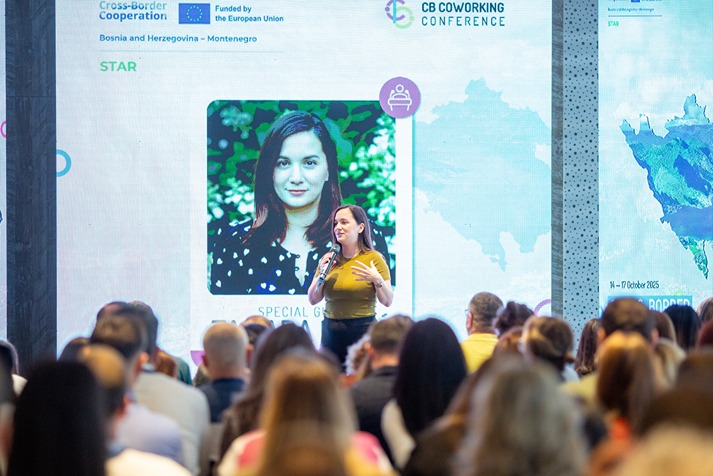 October 17, 2025 – Thanks to the financial support of the European Union, and within the framework of the “STAR” project that promotes tourism and attracts digital nomads to rural cross-border areas of Bosnia and Herzegovina and Montenegro, the four-day Cross Border Coworking Conference (CBCC) 2025 was successfully concluded.
October 17, 2025 – Thanks to the financial support of the European Union, and within the framework of the “STAR” project that promotes tourism and attracts digital nomads to rural cross-border areas of Bosnia and Herzegovina and Montenegro, the four-day Cross Border Coworking Conference (CBCC) 2025 was successfully concluded.
The conference, held from October 14 to 17 in the Bay of Kotor, gathered around 170 representatives of coworking spaces, digital nomads, entrepreneurs, policymakers, and members of the public and private sectors from the region, Europe, and around the world.
CBCC 2025 reaffirmed its role as a key regional platform for promoting innovation, digital transformation, and sustainable tourism based on the concept of coworking and cross-border collaboration.
Through lectures, workshops, and panel discussions, participants exchanged experiences on the future of work, the role of artificial intelligence in marketing, networking within coworking communities, and the importance of connecting with local environments. Among the speakers were world-renowned experts Rowena Hennigan and Nora Dunn, while interactive sessions such as “Boost Your Marketing with AI” and “Pitch Your Coworking” attracted particular attention.
Participants also had the opportunity to further connect and explore the rich cultural heritage of the Bay of Kotor during an excursion to the city of Kotor, supported by the local community and the Mayor of Kotor, Vladimir Jokić.
Regional Cooperation as the Key to Sustainable Development
The organizers – INTERA Technology Park (Mostar), Innovation and Entrepreneurship Center Tehnopolis (Nikšić), and the National Tourism Organization of Montenegro – emphasized that CBCC represents an example of how joint initiatives and projects can help the region build a resilient and sustainable community of innovators and entrepreneurs.
“CBCC has become more than just a conference – it is a movement that connects people, ideas, and values. This year we have shown that cross-border cooperation is not just a slogan, but a reality we are building together,” the organizers stated.
Remote work, especially in rural areas, has been recognized as one of the key development opportunities for cross-border regions.
It was recommended that through the continuation of the STAR project and similar initiatives, cooperation among countries in the region should be further strengthened, new models of work supported, and the mobility of digital professionals enhanced – with the message that the community gathered around the coworking and nomad movement continues to grow and strengthen, transcending borders.